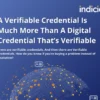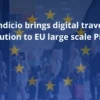2024 will be a huge year for verifiable data. As the industry continues to develop, our team wanted to call some interesting trends to your attention and put together some predictions for what we think will happen this year.
By Ken Ebert
Artificial Intelligence (AI)
AI technology exploded in 2023, with 60% of organizations reportedly using generative AI in some capacity. Two major categories of AI use cases are when an AI does things on a human’s behalf—such as an AI assistant—and when a human uses a generative AI to create things—such as ChatGPT, which can create written documents or images. Our team believes that as AI grows in popularity, particularly in business deployments, the need for identity integrations for both of these categories will grow with it.
When it comes to acting as an assistant and doing things on a user’s behalf, AI will need to be able to prove that it is authorized by a human to act on their behalf. It’s very usefulness as an assistant is tied to whether you can trust it with your secure information. For example, an AI that you can ask to play music for you is useful — but an AI you can trust with your credit card and ask to buy groceries, pay a bill, or even book a vacation? That is what people will pay for. To achieve this level of trust in a robot will require more security than passwords have proven they can provide; it will need mutual authentication and verifiable identity from both the user and the AI.
Generative AI has already caused quite a stir, particularly from artists whose work these platforms have been trained on. While the internet has always been somewhat murky on the origins of work, the ability to give a computer a series of prompts and some guidelines and have it generate a visually-believable image or a plausibly correct article creates a whole new level of skepticism. This problem can also be solved by using verifiable credentials at the point of creation to record a digital “signature” that will allow anyone to check with certainty where a piece originates from and if it has been altered since that creation.
Multi-Credential Systems
Recently, organizations have realized that there is no one “golden” credential type that fits every use case. In fact, our team has seen several platforms moving to support combinations of JSON-LD, SD-JWT, and AnonCred credentials as projects using multiple credential types gain traction. As ecosystems grow and begin to overlap, we will continue to see multiple credential types being used due to their unique benefits, not just due to competing ideas and organizations.
Verifiable Credentials Will Be Folded into Existing Systems
Businesses have begun and will continue focusing on combining verifiable credentials with their existing systems, rather than approaching decentralized identity as an independent technology. Verifiable credentials almost always need to be paired with existing workflows to unlock the value of verified data — once you are certain of the data, then you need to do something with it. In addition, once you have established a trusted digital relationship using the inbuilt secure, bi-directional communication features, a series of other powerful use cases become possible. Some examples include mutually authenticated chat (confirm it’s a real Nigerian prince before you engage with him), faster, more secure interactions with organizations such as your bank, and a better way for employers to manage access for employees.
One real world application that Indicio has been working on in partnership with SITA and the Government of Aruba is verifiable credentials for travel. Using verifiable credentials as the underlying means of data transfer and authentication, travelers can store all the information they need to get through the airport quickly and efficiently, including their passports, VISAs, and boarding passes. Any of these credentials can be stored and verified with a single scan, resulting in a much faster experience at various touch points in a travel journey. And because these credentials draw on the information embedded in an official document, they eliminate the errors that inevitably occur when people are asked to fill in paper forms.
While credentials are an integral part of the equation, many travelers will never think twice about them, and may not even realize they are using decentralized technology. We see this simplicity and speed driving adoption in many other industries, as they realize the time and cost savings to be gained.
Better Awareness of Full Ecosystems
Our team predicts that, as we move through 2024, more people will realize the idea of credential ecosystems as ways to unlock all the benefits of decentralized identity. Being able to verify the integrity of a credential is a huge step forward, but equally important is being able to verify the issuer. For example, if you have a digital driver’s license and you use it as proof of identity to take out a loan, the bank would need to trust that your driver’s license hasn’t been tampered with AND know which authority issued it. From there the bank can make the human decision of whether or not we trust that source. As we continue to build this technology, more people will realize that without a mechanism to decide if you can trust the issuer, a credential alone is insufficient
Organizations Will Learn That They Can Go to Production with What They Have Now
Many organizations have been hesitant to openly adopt this technology or go to market for a variety of reasons, including a feeling that the technology isn’t ready or complete and concerns about needing permission to proceed or authorization from central gatekeepers, such as governments or standards bodies. But this technology is ready right now, and is already in use today. It doesn’t require a huge lift and shift, can be rolled out at whatever scale comfortable with to start, and most importantly, it provides a better way for organizations to manage their tremendously valuable data and implement the governance of their ecosystems. In 2024 our team sees many realizing that they can move forward without the need to wait for others to solve root trust issues or grant them permission to manage their own ecosystem.
Overall 2024 will certainly be one to watch for decentralized identity!
If your team is interested in trying it for yourself, Indicio offers the TestNet as a free tool to build out your ideas. If you’re interested in Indicio’s help building a full solution, please contact our team here.






